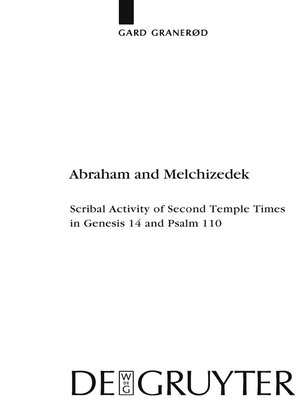Abraham and Melchizedek
ebook ∣ Scribal Activity of Second Temple Times in Genesis 14 and Psalm 110 · Beihefte zur Zeitschrift für die alttestamentliche Wissenschaft
By Gard Granerød

Sign up to save your library
With an OverDrive account, you can save your favorite libraries for at-a-glance information about availability. Find out more about OverDrive accounts.
Find this title in Libby, the library reading app by OverDrive.



Search for a digital library with this title
Title found at these libraries:
| Loading... |
This book, emphasizing Genesis 14 and Psalm 110, contributes to the history of composition of the patriarchal narratives in the book of Genesis and to the history of theology of the Second Temple period.
Genesis 14 was added on a late stage and in two steps: first, Genesis 14* and later, the so-called Melchizedek episode (ME, vv. 18-20). Genesis 14 is the result of inner-biblical exegesis: both Genesis 14* and the later ME originated from scribal activity in which several earlier biblical texts have served as templates/literary building blocks.
As for Genesis 14*, in particular three text groups were important: the Table of Nations, the wilderness wandering narratives and annals from the Deuteronomistic History. As for the ME, it is an example of haggadic exegesis presupposing and without any prehistory independent of its narrative framework. ME is the result of an assimilation between two texts, Genesis 14* and Psalm 110, which assumedly at one point were read as a narrative and a poetic version respectively of Abraham's war with the kings.
Genesis 14 has no value as a source to the history of the patriarchal era and to the religion of pre-Israelite Jerusalem. In contrast, it shows how post-exilic scribes' painstaking study of biblical texts resulted in the creation of new biblical texts.






